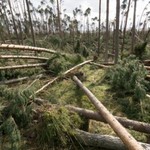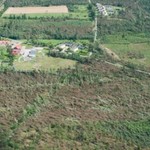17 August 2017 - bbc.com
Tens of thousands of trees have been brought down by storms that wreaked havoc across northern and western Poland, the forestry service says.
The storms over the weekend killed six people, including two Girl Guides who were crushed by a falling tree.
Thousands of homes were also damaged.
Poland's chief forester Konrad Tomaszewski said it would take up to two years to clear the fallen trees, and decades for the lost natural habitat to recover.
He called it "undoubtedly the worst disaster in the history of Polish - and perhaps even European - forestry".
It is estimated the storms brought down over eight million cubic metres of lumber across 45,000 hectares of forest.
Some of the hardest hit areas were Torun, Gdansk, and Poznan - all in the northern and western parts of the country.
In Torun alone, the storms left more than 23,000 hectares of damaged forest. It also destroyed the habitats of rare species.
In a statement (in Polish), Polish State Forests said they found "destroyed bird nests" and "dead animals that failed to escape the storm."
The disaster comes as the Polish government faces criticism for logging in Europe's oldest forest, which is situated in the east of the country.
The Bialowieza forest is a Unesco world heritage site that sits along Poland's border with Belarus, and is home to rare wildlife.
Unesco, EU officials, and green activists have all opposed logging there and last month the European Union's top court ordered that large-scale logging operations be immediately stopped.
Logging banned in Europe's oldest forest
The Polish government responded by saying logging was necessary to protect the forest from an infestation of bark beetle.
The European Court of Justice will meet in a few months to determine whether the injunction will remain in place.
The European Commission is taking legal action against Warsaw, and if Poland loses the case it will be liable for multimillion euro fines.





